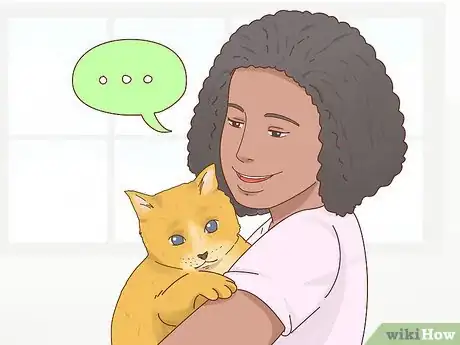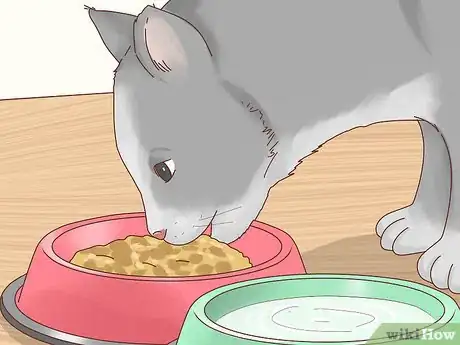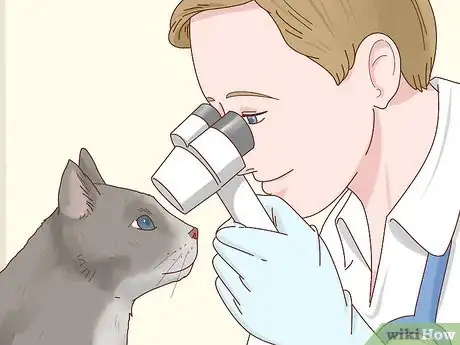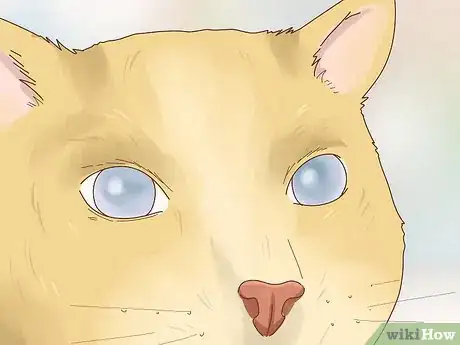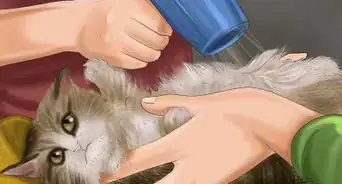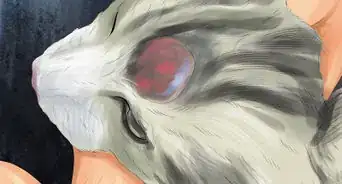This article was co-authored by Jean Johnson. Jean Johnson is a Cat Specialist and a writer for the KittyNook Blog. Jean specializes in providing advice on cat health, play, and general information about cats and cat breeds.
wikiHow marks an article as reader-approved once it receives enough positive feedback. This article received 17 testimonials and 100% of readers who voted found it helpful, earning it our reader-approved status.
This article has been viewed 248,165 times.
Old age, disease or an injury can sometimes cause your beloved cat to go blind. Although distressing for both you and your cat, this doesn't signal the end of a happy and fulfilling life — indeed, your cat will get used to the new state of affairs and you can do a great deal to ensure that your cat still has a happy life. Some things you can do to care for a blind cat include taking her to see a veterinarian, keeping the house clutter-free, and finding new ways to play with her.
Steps
Accommodating Your Blind Cat
-
1Minimize obstacles in your home. Since your cat may have a hard time navigating the house at first, you should do your best to provide a home that is as free from obstacles as possible.[1] Keeping the floor clear will help your cat to navigate the house without bumping into things.[2] Some suggestions for how to minimize obstacles in your home include:
- Leaving your furniture where it is
- Keeping your home clean and clutter-free
- Teaching children to pick up their toys after they are finished playing with them
-
2Maintain a calm environment. Since your cat no longer has her sense of sight to determine whether or not something or someone is a threat, she may be more frightened by loud noises than she was before losing her sight. Help your cat to feel calm and safe by avoiding making loud noises and asking others to do the same.[3] If you accidentally make a loud noise, make sure to comfort your cat by petting her and speaking softly to her. Some other suggestions for maintaining a calm environment include:
- Getting up slowly from a chair instead of jumping up suddenly
- Walking upstairs to speak to someone instead of yelling up to them
- Avoiding slamming cupboards and doors
Advertisement -
3Talk to your cat. Since your cat can no longer see you when she enters a room, you might want to develop a habit of humming or chatting to yourself to let her know where you are.[4] Your cat may also feel safer and more relaxed if you hum and chat when you are around her. This will also help prevent startling your cat when you want to pet her. By announcing your presence, she will be less likely to be surprised by the feeling of your hand on her back.[5]
-
4Take into account the increased need for outdoor safety. If your cat used to go outside before she went blind, stay with your cat as much as you can when she ventures outside.[6] By being present as your cat rediscovers the outdoors, you can rescue her from any mishaps while still allowing her to enjoy being outside.
- Try keeping your cat in an enclosed garden when she wants to go outside. This will help minimize the chances that she will get injured or lost.[7]
- Consider getting a cat harness and leash to prevent your cat from wandering off into danger.
- If you are unable to monitor your cat while she is outside, do not let her go out.
Caring For Your Blind Cat
-
1Follow the veterinarian's instructions for care. If your cat has been diagnosed with a medical condition that requires special treatment, medication, or other interventions, make sure that you follow the veterinarian's instructions. If your cat's blindness is related to a medical condition, it will not improve until she is cured. Contact your veterinarian immediately if your cat's condition worsens or does not improve despite treatment.
- Be aware that some forms of blindness are not reversible even with medical interventions. Your cat may remain blind for the rest of her life, but she can still have a happy life.[8]
-
2Play with your cat. Your cat is still normal. Even though she has gone blind, she will still want to do everything that a cat likes to do, like playing. While buying toys, look for cat toys that are made specifically for blind cats. Also, shift from sight-based games to sound-based ones, such as "follow-the-noise." Anything that crinkles, crackles, resounds or can be tapped can serve as a new source of entertainment.[9]
- Try buying toys that squeak like a mouse or chirp like a bird. Your cat might like to play follow the noise with those types of toys.
-
3Take care of your cat as you always have. Groom your cat regularly, feed your cat nutritious food, provide occasional treats, and take your cat to a vet for regular check-ups. Pay special attention to your cat's nose and ears, as these senses now make life easier for your cat.
- Keep your cat's food and water in the same place they have always been kept.
- Consider adding a second litter box to make it easier for your cat to get to the bathroom in time. It may take her longer to find the box now that she is blind.[10]
Determining if Your Cat is Blind
-
1Schedule an appointment with your cat's veterinarian. If you suspect that your cat has gone blind or is losing her sight, schedule an appointment with your cat's veterinarian right away. Some types of blindness are reversible if they are treated right away. For example, if your cat is suffering from blindness caused by hypertension, a daily medication may restore her sight and prevent further health problems as well.[11]
- Make sure that your cat gets regular check-ups with a veterinarian even if she seems healthy. Early diagnosis and treatment of a problem can prevent your cat from going blind.
-
2Look for signs that your cat has gone blind. Sometimes a cat will go blind over a period of days, weeks, or months. After the cat has become mostly or totally blind, you may begin to notice some strange behavior. Observe your cat to determine if she might be blind. Some of the behaviors that blind cats display include:[12]
- Seeming confused about her surroundings
- Bumping into furniture and other objects
- Missing jumps or landings that she used to manage with ease
- Seeming reluctant to move around or venture outdoors
- Rubbing or squinting her eyes
-
3Inspect your cat's eyes to check for symptoms of blindness. If your cat's behavior has you suspicious that she might have gone blind, inspect her eyes to see if they look different than usual. Even if your cat is not showing signs of blindness, you should inspect your cat's eyes regularly to check for early symptoms of blindness. Some common symptoms of blindness in cats include:[13]
- Eyes don't respond to light, pupils are dilated
- Eyes look cloudy, inflamed, or discolored
Expert Q&A
-
QuestionHow can I tell if my cat is blind?
 Pippa Elliott, MRCVSDr. Elliott, BVMS, MRCVS is a veterinarian with over 30 years of experience in veterinary surgery and companion animal practice. She graduated from the University of Glasgow in 1987 with a degree in veterinary medicine and surgery. She has worked at the same animal clinic in her hometown for over 20 years.
Pippa Elliott, MRCVSDr. Elliott, BVMS, MRCVS is a veterinarian with over 30 years of experience in veterinary surgery and companion animal practice. She graduated from the University of Glasgow in 1987 with a degree in veterinary medicine and surgery. She has worked at the same animal clinic in her hometown for over 20 years.
Veterinarian Try placing an object, such as a briefcase, to block the path of a route she regularly uses. If she walks around it, she can see, but if she bumps into it, she's probably blind. Be aware that some cats also use their whiskers to negotiate obstacles. If the result isn't clear cut, try again with another object in another place and see what happens.
Try placing an object, such as a briefcase, to block the path of a route she regularly uses. If she walks around it, she can see, but if she bumps into it, she's probably blind. Be aware that some cats also use their whiskers to negotiate obstacles. If the result isn't clear cut, try again with another object in another place and see what happens. -
QuestionMy 14-year old cat has gone blind and can no longer get to her box in the cellar. She is messing in the house. What can I do?
 Pippa Elliott, MRCVSDr. Elliott, BVMS, MRCVS is a veterinarian with over 30 years of experience in veterinary surgery and companion animal practice. She graduated from the University of Glasgow in 1987 with a degree in veterinary medicine and surgery. She has worked at the same animal clinic in her hometown for over 20 years.
Pippa Elliott, MRCVSDr. Elliott, BVMS, MRCVS is a veterinarian with over 30 years of experience in veterinary surgery and companion animal practice. She graduated from the University of Glasgow in 1987 with a degree in veterinary medicine and surgery. She has worked at the same animal clinic in her hometown for over 20 years.
Veterinarian Try restricting her to one room in the house and equip it with all her needs, such as food, water, a bed, hiding places, and a litter box. With less space to explore and get lost, she should gradually become more confident about moving around to find the litter box. In the meantime, thoroughly deodorize all areas where she has soiled, as the smell will draw her back to toilet again.
Try restricting her to one room in the house and equip it with all her needs, such as food, water, a bed, hiding places, and a litter box. With less space to explore and get lost, she should gradually become more confident about moving around to find the litter box. In the meantime, thoroughly deodorize all areas where she has soiled, as the smell will draw her back to toilet again. -
QuestionWhy does my blind cat cry all the time, even during the night?
 Pippa Elliott, MRCVSDr. Elliott, BVMS, MRCVS is a veterinarian with over 30 years of experience in veterinary surgery and companion animal practice. She graduated from the University of Glasgow in 1987 with a degree in veterinary medicine and surgery. She has worked at the same animal clinic in her hometown for over 20 years.
Pippa Elliott, MRCVSDr. Elliott, BVMS, MRCVS is a veterinarian with over 30 years of experience in veterinary surgery and companion animal practice. She graduated from the University of Glasgow in 1987 with a degree in veterinary medicine and surgery. She has worked at the same animal clinic in her hometown for over 20 years.
Veterinarian Some blind cats yell so that they don't feel alone, as they can't see people or animals around them. Some cry for attention and to get someone to come and take notice of them. This is especially likely if you have comforted her in the past when she cried. If the cat was previously sighted and has lost her vision, then the crying could indicate she has a medical problem which needs further treatment in order to feel well.
Some blind cats yell so that they don't feel alone, as they can't see people or animals around them. Some cry for attention and to get someone to come and take notice of them. This is especially likely if you have comforted her in the past when she cried. If the cat was previously sighted and has lost her vision, then the crying could indicate she has a medical problem which needs further treatment in order to feel well.
Warnings
- A cat with symptoms of failing eyesight should be taken to see a vet immediately.⧼thumbs_response⧽
- A cat with a condition such as diabetes must be checked regularly for signs of oncoming blindness.⧼thumbs_response⧽
- Many cases of total blindness are untreatable.⧼thumbs_response⧽
References
- ↑ Jean Johnson. Cat Expert.
- ↑ https://www.aspca.org/pet-care/cat-care/blindness
- ↑ https://www.aspca.org/pet-care/cat-care/blindness
- ↑ Jean Johnson. Cat Expert.
- ↑ https://www.aspca.org/pet-care/cat-care/blindness
- ↑ Jean Johnson. Cat Expert.
- ↑ http://www.icatcare.org/advice/cat-health/sudden-onset-blindness-cats
- ↑ https://www.aspca.org/pet-care/cat-care/blindness
- ↑ Jean Johnson. Cat Expert.
About This Article
To take care of a blind cat, start by taking it to a vet right away, since some types of blindness are reversible if treated early enough. Next, minimize obstacles in your home and keep it clutter-free so your cat can navigate easily. It's also important to maintain a calm environment, since blind cats may find loud noises extra frightening. Additionally, try humming and chatting around your cat frequently so it always knows where to find you, since this can be a great source of comfort for a blind kitty. For tips on recognizing early signs of blindness, read on!


